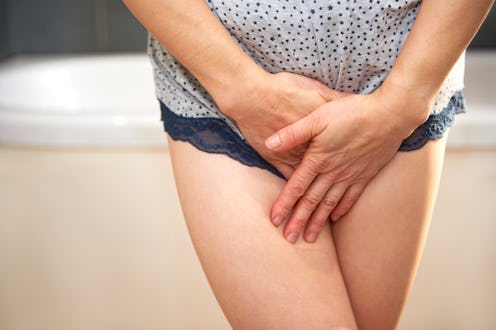
When you have to pee, but you're right in the middle of something important, do you wait and finish up what you're doing before going to the bathroom, or do you immediately drop everything and run to the toilet? If you're in the former group, you could potentially be putting your health at risk: According to a new video on what happens when you hold your pee from SciShow, crossing your legs and putting it off for too long isn't healthy. The good is that it's only a problem if you make it a habit; but then again, the bad news is... it's a problem if you make it a habit.
Before we get into looking at the specifics of what happens to your body when you hold your pee, let's talk about how often you should be peeing first. There's no universal answer, since how often you pee depends on how much fluid you're drinking, your age, your height, and your size. On average, though, you should be peeing around eight times a day according to experts, so if you're peeing a lot less or a lot more than that, you may want to consult your doctor.
So what happens when you actively prevent yourself from peeing? These four things, for example — and there's loads more where they came from, so be sure to scroll down to watch the full video.
1. Your Sphincters Close
Cylindrical sphincters in your bladder alternately hold in and release your pee to your urethra. When you hold your pee, those sphincters close up tightly to keep all of your urine inside of your bladder, so as to prevent leaking. So that tight clenching feeling that you get when you're holding in a lot of pee? It comes from these sphincters working to stop your urine from coming out.
2. You Can Develop Infections
Now, this only applies to those people who hold in their pee for long periods of time or hold their pee frequently, so as long as you make sure to head to the bathroom consistently, you're good. If not, however, the habit could lead to some not-so-fun long term consequences, like having an increased risk of bladder and UTI infections.
3. You Can Develop Urinary Retention
Another possible long term effect of constantly holding in your pee for long stretches of time is urinary retention, or "the inability to empty your bladder completely," according to the video. Holding in your pee actually weakens the muscles in your bladder, which can cause you to develop urinary retention as you get older.
4. Your Bladder Could Burst
Although this is extremely rare and probably not something you need to concern yourself with, some people actually do burst their bladders. Most of these rare cases happen to those who already have damaged their bladders, though, so again, it's probably not something you need to be worried about.
But even if most of us don't have to worry about our bladders bursting, there's still another terribly consequence that can happen from reaching the point of not being able to hold our pee any longer. To find out what it is, watch the full video below:
Images: Peter Dazeley/Photodisc/Getty Images; SciShow/YouTube (4); Giphy